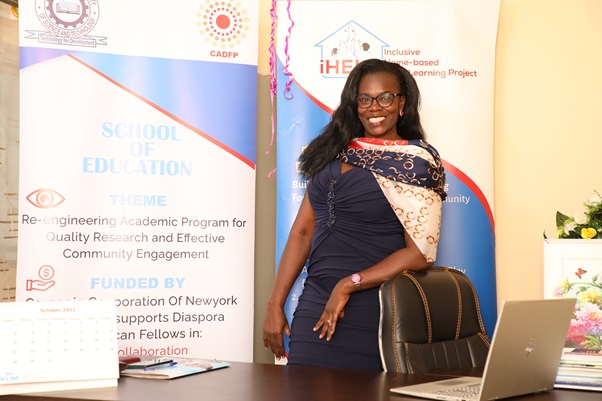The IHELP Principal Investigator, Dr. Rose Opiyo.
Following a highly competitive process, the Inclusive Home-based Early Learning Project (IHELP) has been selected to benefit from the International Development Research Centre (IDRC) – GPE KIX extension and expansion grant until 2027. This is due to its outstanding impact in providing cost-effective and sustainable quality Early Childhood Care and Education (ECCE) for marginalized children from communities in Kenya, Uganda and Zimbabwe. The project is one of the exemplary applied research by communities.
The Global Partnership for Education (GPE) Knowledge and Innovation Exchange (KIX) is a joint initiative with Canada's International Development Research Centre (IDRC) that serves as GPE’s evidence arm by sourcing evidence needs across GPE partner countries. A key part of that is the generation of demand-driven, actionable evidence and innovation to scale impact and strengthen education systems in low- and middle-income countries.
This project is based on three major ECCE models which include the home-based, centre-based, and play-based models. These models have shown great success in improving learning outcomes for young learners, however, they do not explicitly address children with disabilities and children from extremely poor households who are unable to attend ECCE centres. In regards to this, the project is building evidence on the effectiveness of a hybrid approach to early learning, and to encourage teachers and parents to support learning in both the home and the classroom particularly for students with disabilities through enhanced sensory experiences.
Currently, the project is working with 32 ECCE centres, and with the positive response it has received from community stakeholders, it is set to open 10 additional centres. The extension will enable the project to continue strengthening the capacity of families, communities, teachers and policymakers by actively engaging them as co-creators and leaders in these models. It will also continue to strengthen national and regional knowledge-sharing capacities to ensure that the needs of students with disabilities are effectively addressed. To further adapt the IHELP model, the extension will also focus on incorporating school-readiness material into its approach, ensuring the best possible learning outcomes.

Dr. Rose Opiyo at her office.
The introduction of home-based centres encouraged the enrolment of children especially those with special needs. In the Kalaki district (Uganda) and Ikolomani Sub-County (Kenya), officials have now designated IHELP’s home-based centres as primary data collection points. In communities that do not have access to formal schooling, parents who have been involved with IHELP have provided spaces within their compounds, developed learning and play resources for children, and lobbied the community to ensure children access them.
Recognising the gap in government support for family and community engagement IHELP models seek to adapt and upscale key elements of early learning. The project is envisioned to increase community- to national-level action by providing access to quality ECCE for children including those with disabilities in Uganda, Kenya and Zimbabwe.
By Linet Owuor
Photos by Shiundu Masafu





